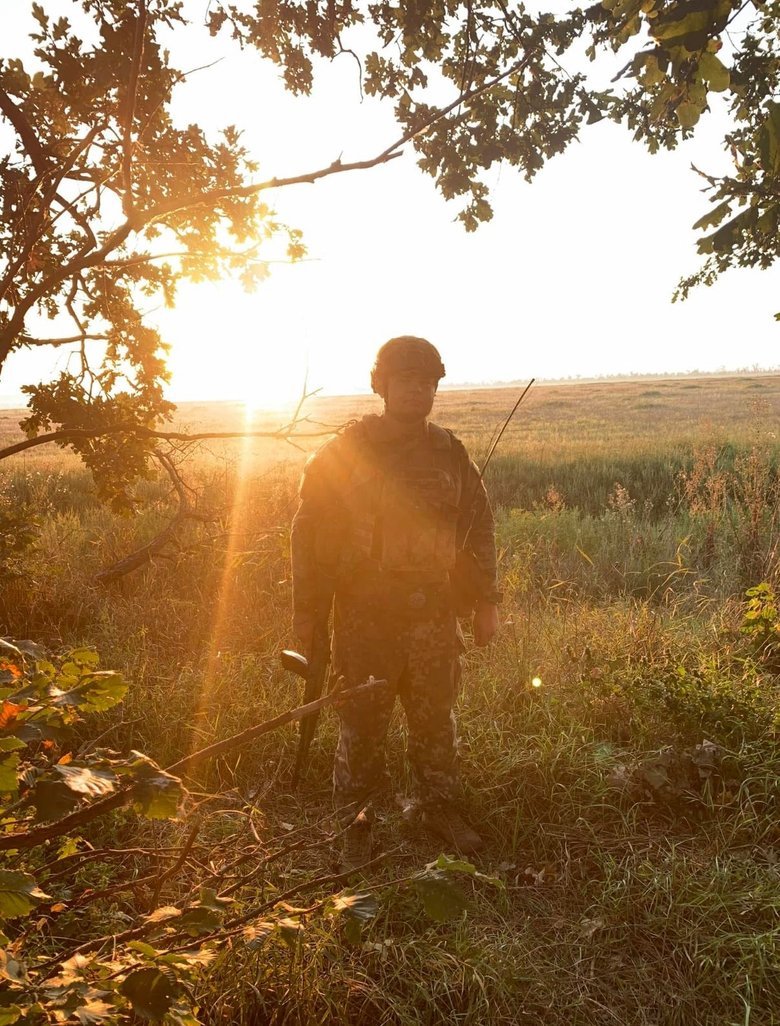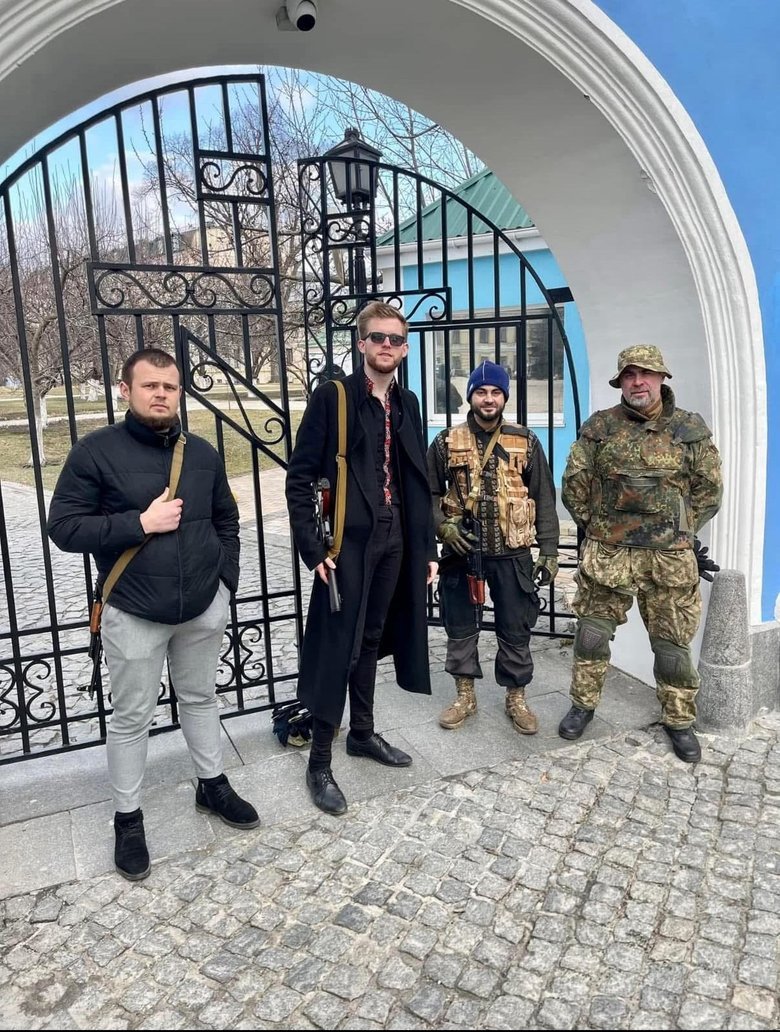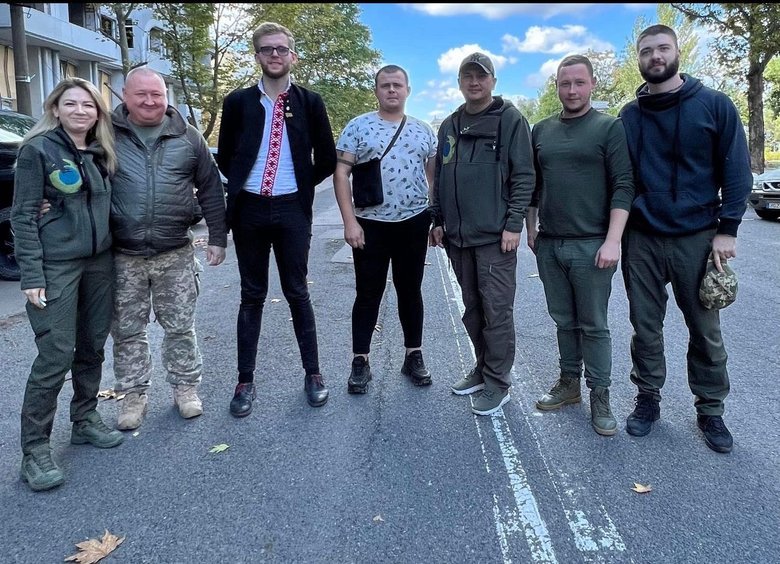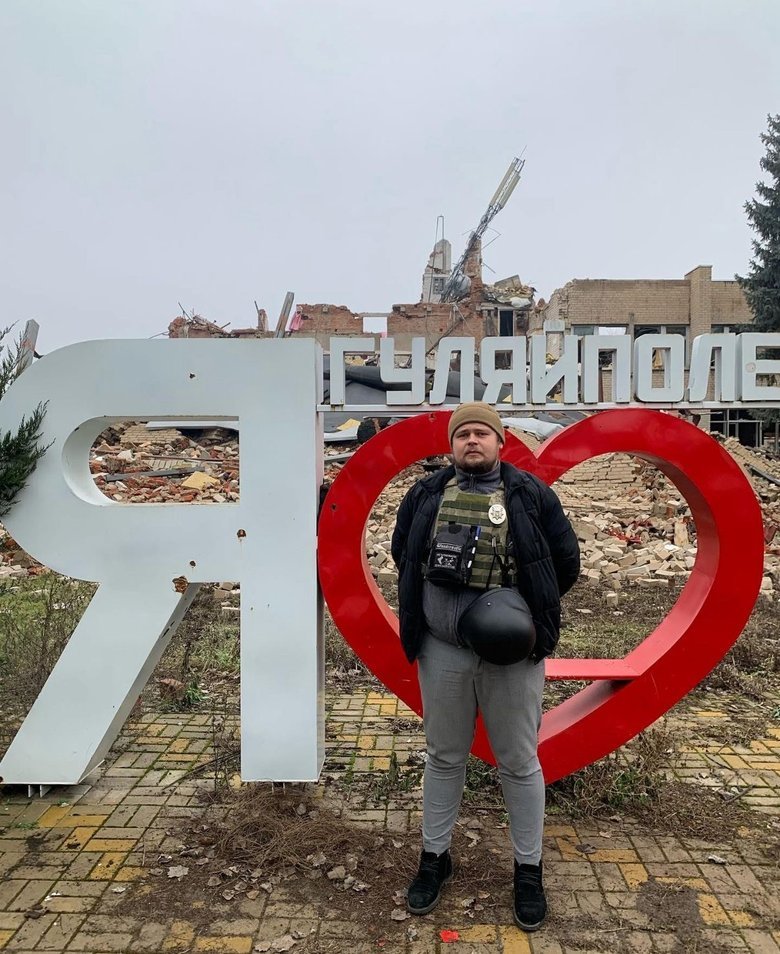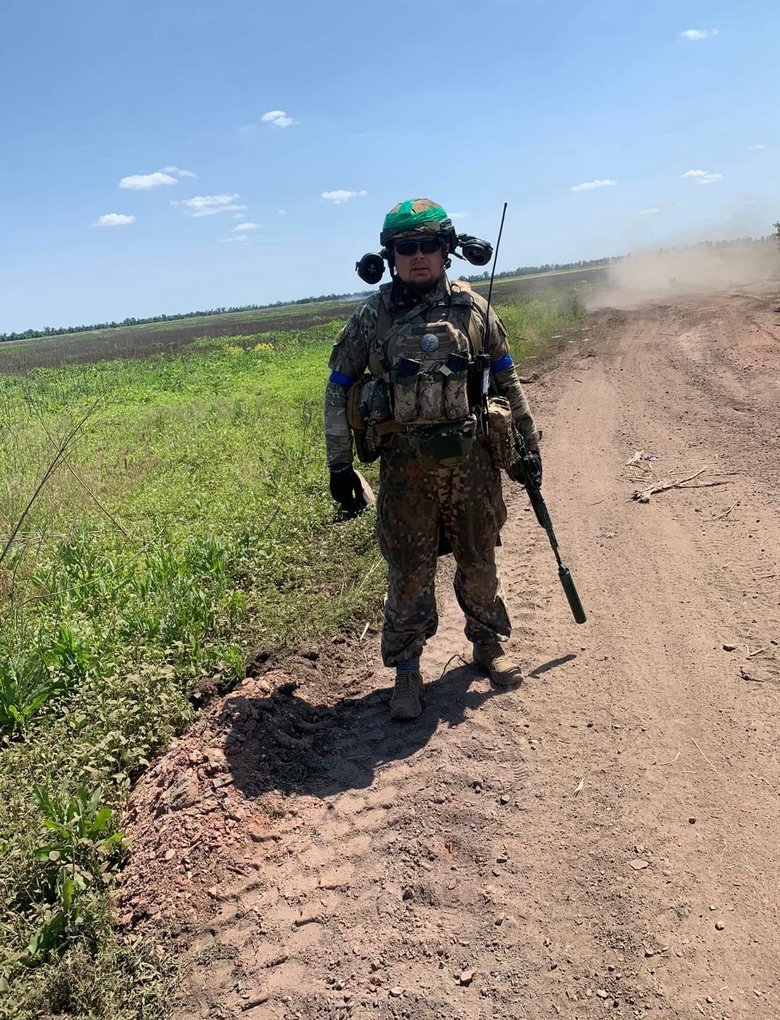Call sign Deputy: "Ka-52 flew past us and fired missile. Quite sight! After that, mortar was hardly noticeable"
Volodymyr earned the call sign "Deputy" for a reason, in peacetime, he was directly involved in politics, working as an aide to a member of parliament. His focus was mainly on local community issues in the Kyiv region. But when Russia launched its full-scale invasion, his life, like that of all Ukrainians, changed completely.
He couldn’t be mobilized due to his young age and lack of military experience, so he joined a Volunteer Formation of the Territorial Community (VFTC) and the following year, at 24, he signed a contract with the Armed Forces. He started out in reconnaissance. He now serves as a UAV section commander in the MAD HAWKS battalion.
- In the run-up to the full-scale invasion, international partners repeatedly warned us about Russia’s plans. The Verkhovna Rada was also constantly discussing it. How did you take those warnings? Did you believe it was really possible?
- Yes, our allies warned that Russia was preparing a full-scale invasion. But, to be honest, few truly believed it would actually happen. We kept working. To give you an idea, on February 23, the day before the attack, we still had a meeting with the then head of the Kyiv Regional State Administration, Oleksii Volodymyrovych Kuleba. We discussed joint work, planning, cooperation, and coordination. I did have a gut feeling that something might happen, but I didn’t expect anything on that scale, just like most people.
- How did you find out about the start of the full-scale invasion?
- I woke up to explosions. I immediately opened Telegram to see what was going on. The first reports were already out that the invasion had begun. Sleep was out of the question. You just sit there, scrolling news, not understanding what’s happening or what to do.
- That morning, did your boss go to the Verkhovna Rada to vote to impose martial law? What did you do?
- I went there as well. My boss asked if I was planning to leave the country. I said no. From that moment on, we were constantly in central Kyiv, mainly in the government quarter.
- What were you feeling then?
- There was no understanding of what might happen next. Just uncertainty. We were issued weapons…
- Did you know how to shoot?
- I’d taken military training at university, so I had the basics. I still remember how my boss and I were loading magazines in the rain on Sofiiska Square.
And that uncertainty was amplified by all the chatter around us. Someone would hear something somewhere, twist it or embellish it and off it went! For example, people were saying Russians were already downtown on the embankment. For a while, you freeze up at that kind of information. But what can you do?! It is what it is. Then it turns out it wasn’t true. It was all against a backdrop of constant explosions and reports that helicopters were inbound. Naturally, everyone was a bit knocked off their feet. (he smiles – О.М.).
- What exactly did you do?
- We drove around Kyiv and the region, checking on people and helping where we could. My boss, together with the guys we met (many of whom I’m still friends with), was delivering humanitarian aid, including to Hostomel. He later mobilized. By then, they were already moving out to positions. I joined the VFTC. I served in Kyiv and the Kyiv region.
- You weren’t mobilized, were you?
- I couldn’t be officially mobilized yet because I was 24, hadn’t done conscript service and had no military experience. So I went into the VFTC.
- How did your parents react?
- My father was with us in the volunteer formation too.
- Did having him nearby make things calmer or harder?
- Calmer and easier than being alone. Now, for example, my father serves too, but we’re not only in different units, we’re even in different branches. That’s better.
- Did you engage the enemy then?
- Not at first. After the enemy was driven out of the Kyiv region, we started running humanitarian missions to Mykolaiv and Kherson regions. Those were interesting times. They brought in the "three-sevens" artillery there. Our guys were just operating it. We managed to pull the lanyards and fire it at the enemy. It was unforgettable (he smiles – О.М.).
We also went to the Zaporizhzhia region, including the town of Orikhiv, where the situation was difficult then and remains so now. Later, we made frequent trips to Donbas.
- How did you end up in the army?
- Given my age, the only way to join the army was to sign a contract, which I did on January 2, 2023. Just three days later, I went abroad for training in Latvia.
- Did you like it there?
- Yes. It was a standard Basic Combined Arms Training course, everything as it should be. We were treated very well. Overall, it was great. We arrived there in winter, snow everywhere, colder than back home. It was fun running through the forests. And since it was only about 50 kilometers from the Russian border, the training was particularly interesting (he smiles – О.М.).
- What did the Latvians say about the war?
- One of our two Latvian instructors, by the way, is from Ukraine - from Donbas. He was born there, but moved to Latvia with his parents when he was a child. You know, when we had finished our training, received our certificates and were leaving, some of the instructors were crying. They understood where we were going. They realised that someone would die or be injured...
And the second instructor, who was assigned to our group, still writes to me on social media to this day, asking how we are doing.
- Where did you end up after training?
- Back to training (he smiles – О.М.). This time to qualify as a BMP-2 gunner-operator.
- Did you choose that specialty, or were you assigned?
- At first, when I signed the contract, I didn’t have a letter of request. Then representatives from various units came to talk to us. I ended up speaking with a serviceman from the 505th Marine Battalion. He asked, "Will you join us?" "All right, let’s do it!" That’s how it happened. The training center then issued me a letter of request as a BMP-2 gunner-operator. I did another month of training in Ukraine. I deployed to the front, but not in that specialty. I was placed in reconnaissance.
- Why so? Were there no BMP-2s?
- Yes, there were not. We had Western hardware and that’s what we were operating. So I ended up in reconnaissance. When I arrived, our commander at the time was still away on a training course abroad (he’s now listed as missing in action). Call sign "Archaeologist." A career officer. A reconnaissance man. He rose from seaman to captain, specifically in marine reconnaissance. He was extremely competent, courteous, humane...You rarely meet commanders like that. I was lucky to serve under him. He came back from training, we met, an outstanding commander. He always went out on missions with us, even though he didn’t have to.
He was unflappable. Here’s an example. I was temporarily acting as executive officer because the actual one also went out on missions and took a severe wound on one of them. I stayed at the command-and-observation post. The commander was on one position, and the adjacent one took a hit, two WIA. The driver couldn’t orient himself to reach the wounded. The commander guided him by radio. Calm as can be. We could all hear it. His tone was so steady he could’ve been advertising a sedative (he smiles – О.М.).
- Where were you fighting at the time?
- We were sent to the Donbas region right in the thick of it, during the major counteroffensive everyone was talking about in Zaporizhzhia and Donetsk regions. The entire Marine Corps was in there then. Our advances varied. Some days we took two tree lines in 24 hours. Other days, we wouldn’t even make it in, and spent the whole day pinned down under fire in a small tree line. Also, we were sprinting back and forth because the shelling never stopped.
- Recall your first combat mission.
- On June 6, 2023, we assaulted Novodonetske. We hadn’t even gotten into the vehicles when mortar fire and tube artillery started coming in. And toward the end, they hammered us with Grad salvos.
A couple of hours later, as we pushed closer to the village to dismount, it started again: "Vasylok," mortars, tube artillery. No Grads this time. But a Ka-52 showed up, ferrying troops that were literally two tree lines away from us…
- "In a luxuriant way"!
- Yeah, they gave us a proper "welcome" (he smiles – О.М.). We’re lying in a tree line and they’ve already hit us with everything. Nowhere to hide — no cover at all: no dugouts, no trenches, nothing. You hear the whistle, you dart the other way, and you keep sprinting like that. Then I hear that distinct jet roar. Terrifying. I thought, a Su coming, we’re done for. But no. It flies past us and fires a missile. Quite a sight! After that Ka-52, mortar was hardly noticeable (he laughs – О.М.).
- How did that assault end?
- With nothing. They later brought up a column of vehicles from a completely different brigade. Were we supposed to support it? With what? We had Kalashnikovs, a few RPG tubes, and grenades. What are you going to do with that? They started pounding us even harder. In the end, our group had two WIA, and most of the guys were shell-shocked. No one made it into the village. That was the end of our assault.
- Did you take that village afterward?
- No. The enemy was very well prepared — they had pulled in a lot of equipment and manpower.
- That counteroffensive didn’t turn out as successful as planned…
- We spent a lot of strength. And the villages we did take back then are all occupied again today. And you just can’t understand: what did the guys die for then? Donbas took a lot of our people. We tried to recover everyone, to give them a proper burial and return them to their families. It’s a real tragedy that it turned out that way.
- After Donbas, you went to the Kherson region, right?
- Yes, there was the "Operation at Krynky." I’ll tell you how I learned about the move. The company commander comes from the brigade`s command post and says, "Got a minute?" I step out. "Two pieces of news, good and bad. Which first?" "The good one!" "We’re relocating." "Okay, and the bad one?" "Tomorrow at 05:00 a.m., you’re heading out on reconnaissance." "All right then." So off we went to look for locations to set up. We arrived, found them; I plotted points and took photos, where we’d live, where the vehicles would go, and so on. That’s how we moved to the Kherson region. After that, the commander and I started conducting reconnaissance together. I remember we had a white Dacia…
- A truly "inconspicuous" car!
- (he smiles. – O.M.) And with Donetsk plates, no less. That’s how we had to work. Before each run, the commander would ask me, "Volodia, what are your plans for tomorrow?" I’d say, "Mykhailovych, I’ve got no plans for the next two and a half years" (he smiles – O.M.). And off we went. On Kherson’s side, the right bank is higher than the left. We drive into a village where there are no houses left, everything is destroyed, no one lives there. It’s right above the Dnipro. We look across and there’s smoke rising from the woods on the left bank. Mykhailovych says, "Volodia, see that smoke? That’s where the b@stards are already." I answer, "Yeah, I get it — they’re not there for a picnic" (he smiles – O.M.). We had plenty of interesting moments like that. Once three of us showed up (me, my commander, and another company commander), and a mortar was pounding the very village we were in. My company commander says, "I may be an old stump, but I plan to die an even older one, so let’s get the f@ck out of here!" Even so, like I said, he went out on every mission.
- The guys who fought in the Kherson region back then said it was real hell. You had also come from a hard sector. Did it feel even worse there?
- Yes. In Donbas, the tree lines make it simpler. Here it’s water. You sit in a boat knowing that if an FPV hits, that’s it. There were plenty of cases like that. The Kherson region took more of our guys than Donbas, partly because it’s so exposed. Sure, we hid in cellars and basements, but those took hits too. As far as we know today, the commander remained in a cellar. He went to positions where there were many KIA and WIA, and where young guys who hadn’t fought in Donbas were still holding on. The battalion commander wasn’t letting him go forward yet. But he didn’t want to leave the boys there alone. He went. He was wounded at first, but over the radio, he refused medevac.
- Did the guys not make it back either?
- No one did. The cellar where they and the commander were was peppered with grenades by the Russians, that was it.
- How did you find out?
- Our drone was hovering there.
- How much longer did you stay in the Kherson region after that?
- Not long. We shifted to the defense there. The Marine brigades were rotating each other. We replaced the 36th Brigade and worked on electronic reconnaissance and UAVs.
- What did you have at that point? Were you using FPV yet?
- Of course! The "Wild Hornets" helped us a lot with drones. Reconnaissance companies are supposed to have ISR UAVs, not strike ones. But we took the initiative, let’s try FPV to support our guys during assaults and run supplies to them. It’s simply more practical.
- In the Kherson region, was the enemy using more drones?
- There was plenty besides drones, constant KABs and artillery. They even brought in the "Solntsepyok" heavy flamethrower system to greet the guys as they landed on the left bank. It rattled them a bit, you don’t see many of those systems on the front, and there it was.
- You later returned to Donbas. Comparing that period with today, what would you say?
- The war is different now. Back then, it was more artillery and infantry; today, drones do most of the striking. Artillery hasn’t gone anywhere. We have it here, too. But there aren’t that many gunners who can hit, say, a vehicle precisely. It’s much easier to do that with a drone.
- I recently interviewed Yurii Syrotiuk from the 5th Brigade; he says the war is already happening underground. Is that so?
- In fact, yes. This makes it very difficult. It's always difficult for infantry, but in the current situation, it's really the hardest. We will see what happens next. How many times has it been said that the war is about to end...
- Right, we were "having coffee in Crimea" two years ago already…
- You stop reacting to that talk. If it ends, great. If not, we keep fighting. Do we have a choice? We don’t.
- It’s hardly the time to talk about the end of the war, the enemy keeps pressing, is conducting its autumn draft, and, judging by their statements, has no plans to stop. What’s your take on that?
- Let’s put it this way: I wouldn’t count on them stopping on their own. But we have support from our Western partners, and if that support grows, we’ll manage. Still, to hold the line now, we need everything at the front — equipment, weapons, and people.
- But our mobilization effort has failed. The government isn’t having a serious conversation with society about it, quite the opposite, it’s even pandering. For example, they recently allowed men aged 18–22 to travel abroad. As someone who signed a contract and volunteered to fight, how do you see that? Many say it’s a drain of young people who could be defending the country, especially since no one knows how long this war will last...
- You know, those who wanted to fight have already joined, even the ones who just turned 18. It’s always better to have a motivated soldier who came of his own will than someone dragged in by force. Same here: if they want to leave, let them. That’s their conscious choice. And those who decide to defend their home, family, and country can still come back.
I don’t even condemn the draft-age men who fled abroad or are hiding at home now. Yes, we need people, but an unmotivated person is a headache for any commander. They’re hard to work with, need extra attention, and so on. So, no judgment. If that kind of life suits them, fine, let it be.
- Finally, do you think about the future? Or do you, like many Ukrainians, live one day at a time?
- I’ll put it this way: when I signed the contract, I didn’t think I’d last long. You know, anything can happen in war. Thank God, things have turned out fine so far. But we don’t even know what the evening will bring. Of course, you want to think about the future. However, the reality is, if you’ve made it through today, that’s already not bad.
P.S.: Friends, we’re asking you to support Volodymyr’s unit, which is carrying out combat missions on the Donetsk front. To operate effectively our troops need reliable autonomous power, an EcoFlow station that will allow uninterrupted charging of comms equipment, drones, thermal imagers and other critical kit.
Without stable power, operating equipment on the frontline becomes extremely difficult or even impossible. Every hryvnia you give will help bring victory closer and save service members’ lives.
Details:
https://www.privat24.ua/send/3h7ty
Card number: 5168752140910913
Olha Moskaliuk, Censor.NET
Photos provided by the interviewee

